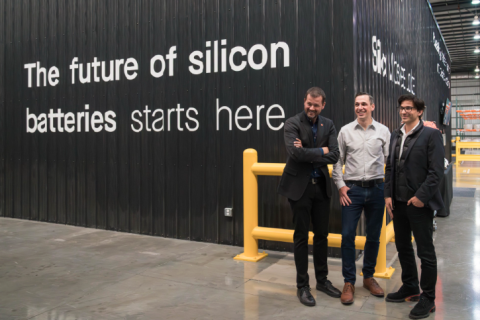
Gleb Yushin, MSE Professor and co-founder of Sila, is marking a major milestone in the journey from lab innovation to industrial impact. Sila, a next-generation battery materials company, has officially begun operations at its new Moses Lake facility in Washington. It’s the first auto-scale silicon anode plant in the United States.
“This is a defining moment for Sila and for me personally,” said Yushin. “We not only invented the modern silicon anode here in the U.S., but we’re also scaling it here. That’s a rare and powerful achievement in the world of battery innovation.”
The Moses Lake plant represents a dramatic leap in scale— more than one million times larger than Sila’s original R&D line— and positions the company at the forefront of domestic battery material production. For Yushin, the launch is the culmination of over a decade of research, persistence, and teamwork.
Sila’s breakthrough technology traces its roots back to Georgia Tech, where Yushin began foundational research into silicon/carbon (Si/C) composites using chemical vapor deposition (CVD). “Georgia Tech was incredibly supportive, not just of the science, but of my entrepreneurial vision,” he said. “We cracked some of the core science here, and that’s what made Sila possible.”
The journey wasn’t without challenges. Silicon, while promising for its ability to store ten times more lithium than graphite, presents significant mechanical and electrochemical hurdles due to its tendency to swell during battery cycles. Yushin and his team overcame these issues by engineering a carbon-based porous scaffold that stabilizes the silicon, enabling safe and efficient battery performance.
“Our biggest challenge was to solve this critical issue in a scalable way,” Yushin explained. “We had to control the composite features with incredible precision at the nanoscale, and we figured out how to do that, starting at Georgia Tech.”
Sila’s technology is already making waves across industries, from electric vehicles and grid storage to AI infrastructure and consumer electronics. With the new facility, the company is poised to accelerate the global shift toward cleaner, more efficient energy. “In less than a decade, nearly every human on this planet will be directly or indirectly benefiting from the Si/C technology we invented,” Yushin said.
To Georgia Tech students and researchers aspiring to bring their innovations to market, Yushin offers this advice: “Impossible is only impossible until someone does it. Stick to your vision, remain flexible, and surround yourself with people who are not only smart but also persistent. That’s what it takes to turn breakthrough science into real-world impact.”